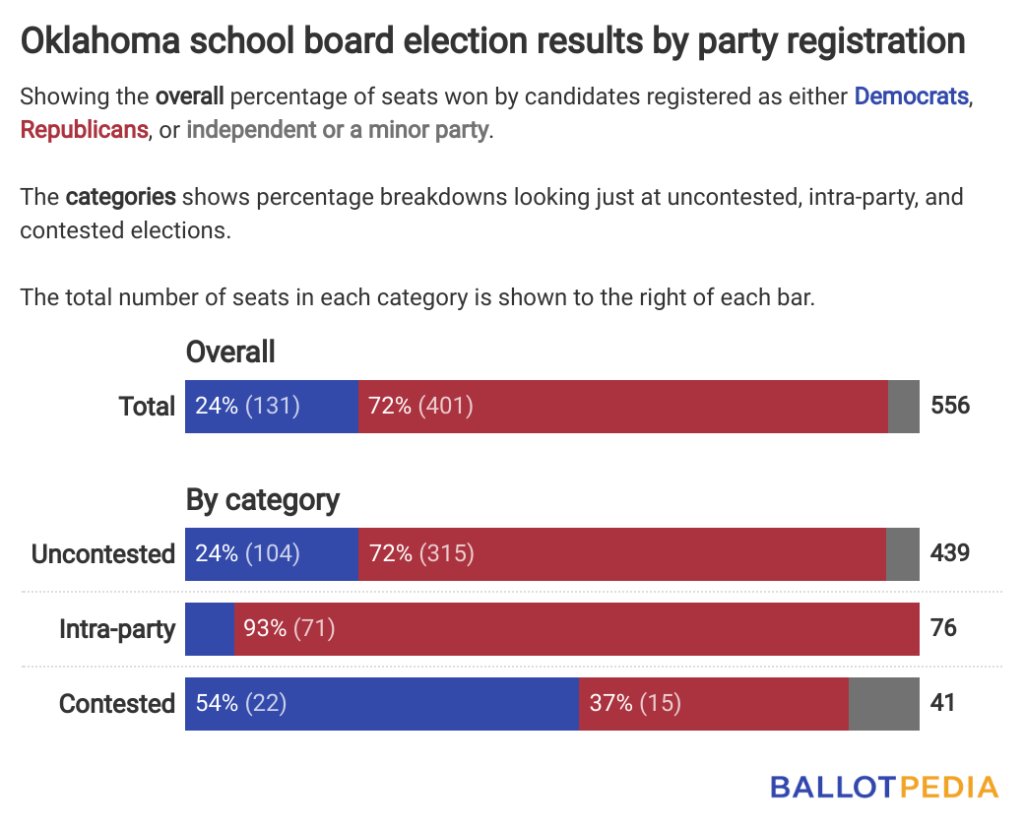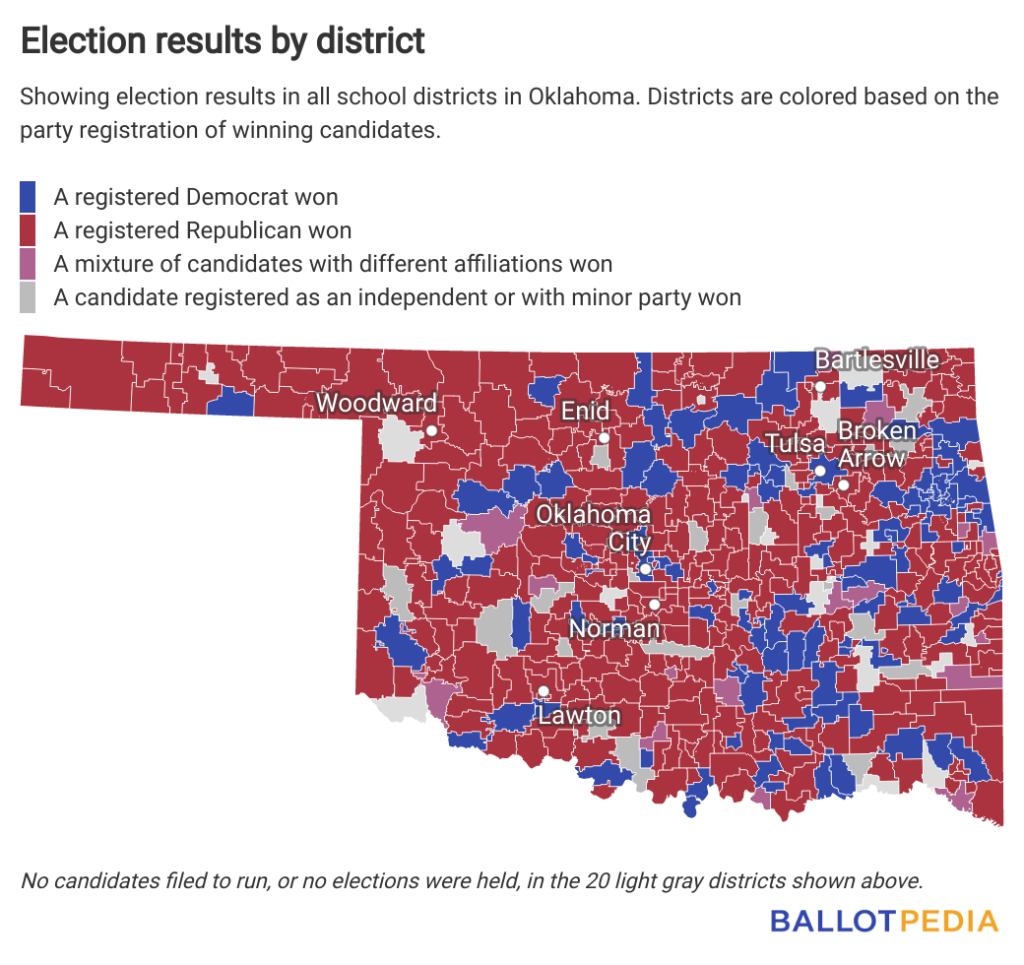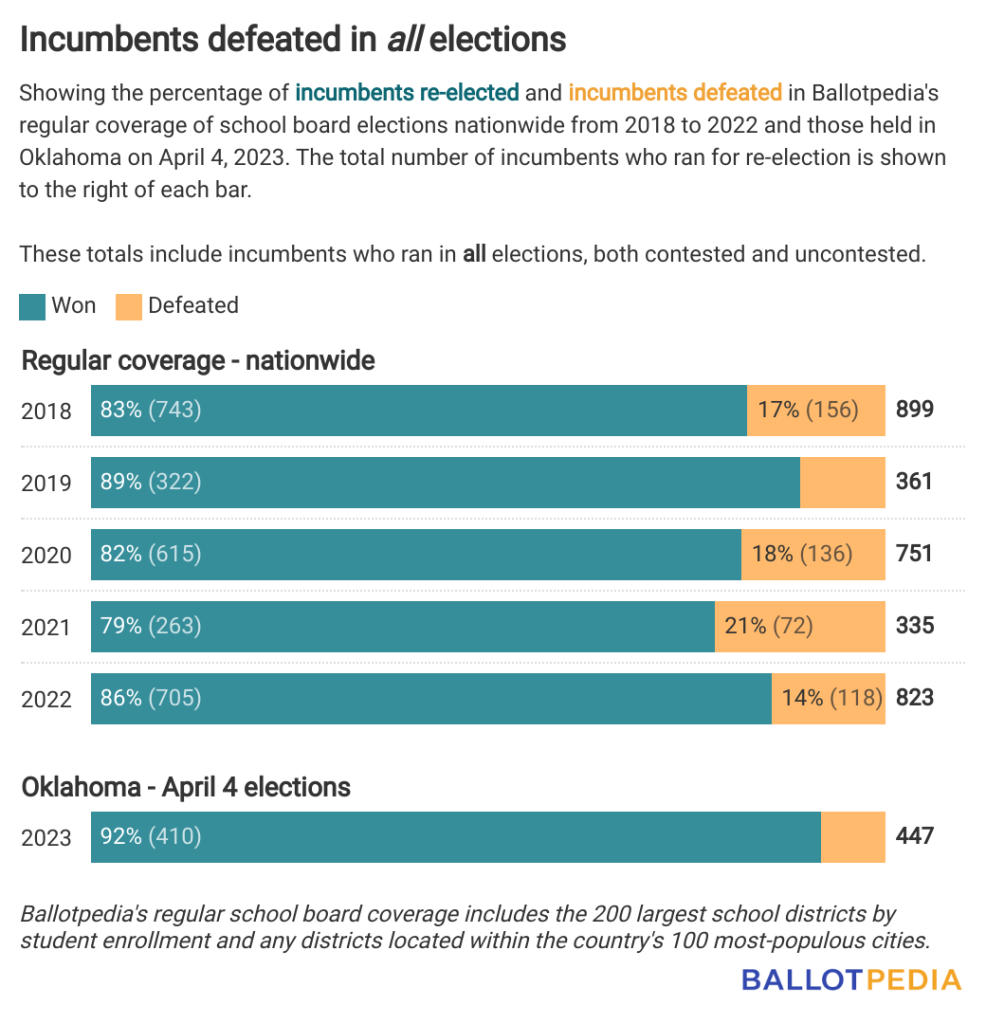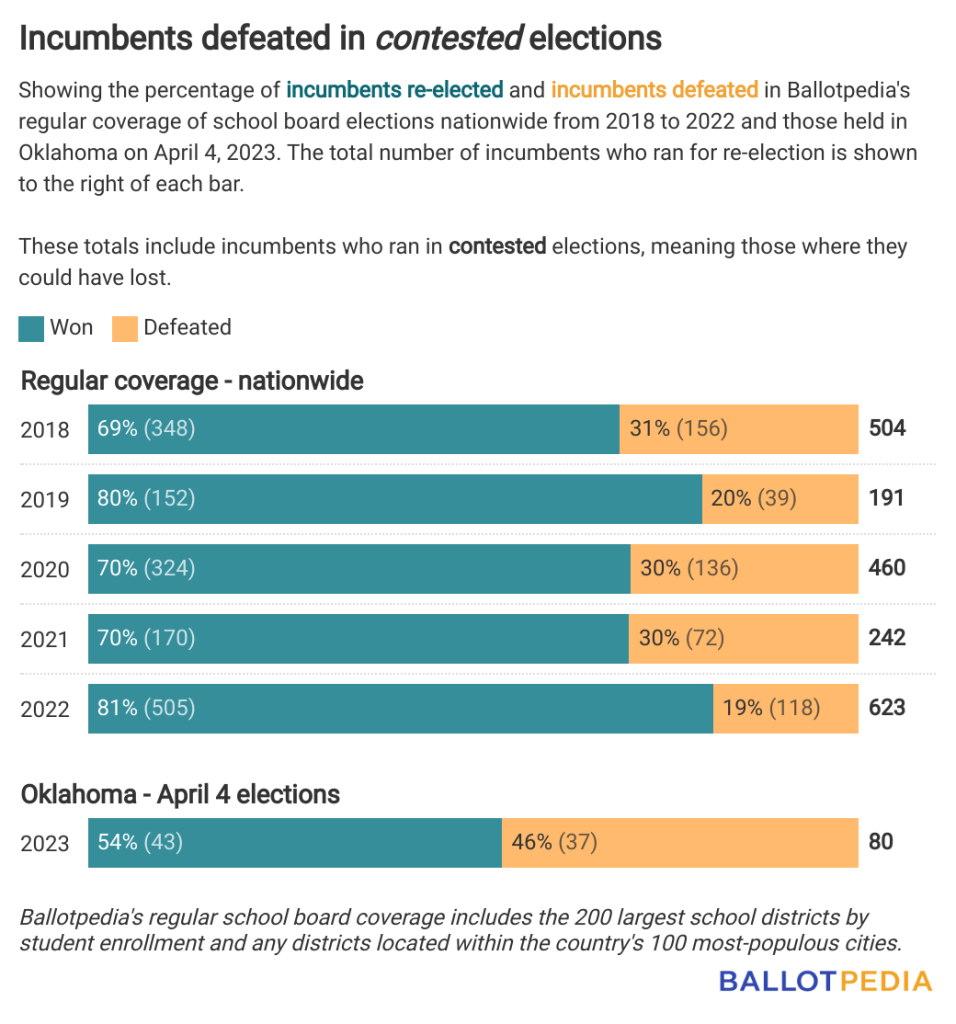Welcome to Hall Pass, a newsletter written to keep you plugged into the conversations driving school board politics and governance.
In today’s edition, you’ll find:
- On the issues: The debate over classical education
- In your district: reader replies on district reading programs
- School board filing deadlines, election results, and recall certifications
- A comprehensive analysis of Oklahoma’s April 4 elections
- Extracurricular: education news from around the web
- Candidate Connection survey
Email us at editor@ballotpedia.org to share reactions or story ideas!
On the issues: The debate over classical education
In this section, we curate reporting, analysis, and commentary on the issues school board members deliberate when they set out to offer the best education possible in their district.
Classical education typically emphasizes philosophical, scientific, and literary texts beginning in Ancient Greece and Rome and continuing through the Medieval and Renaissance periods (though classical curriculum can include more recent texts). Authors often include Aristotle and Homer, as well as Shakespeare and Jane Austen. Recently, public charter schools in Florida, Texas, New York, Michigan, and elsewhere have offered curricula built around classical education.
The South Florida Sun Sentinel Editorial Board writes that classical learning is too Eurocentric, religious, and lacking in diverse perspectives. The Board says public schools should teach with more contemporary materials that contain diverse perspectives relevant to students’ experiences.
Cornel West and Jeremy Wayne Tate argue that classical educational materials convey timeless truths that spur and direct positive social changes. West and Tate also say that classical materials help students reason better and understand the world without referring to contemporary issues that can be political.
DeSantis embraces ‘classical education,’ but what is it? | The Editorial Board, South Florida Sun Sentinel
“[Classical learning] leads students to views that are out-of-date and Eurocentric. Since many of those great texts were crafted in theocratic societies, they tend to be more overtly religious, and the religion is almost exclusively Christianity, which is generally portrayed as tantamount to virtue. The roles of women and ethnic minorities are less likely to be included in lessons, and there’s little mention of marginalized communities. Students are rarely exposed to the perspective of someone ‘other’ through ethnicity or sexuality. There are certainly ways to adapt classical learning models to avoid these pitfalls. But DeSantis’ version of classical education is far more rigid than those idealistic models — and his apparent allergy to diversity, equality and inclusion plays into that. External reviews of common, contemporary classical curriculum show that they downplay the contributions of women and minorities — lessons that many classical educators describe as a ‘focus on victimhood,’ but are really a welcome dose of reality that matches well in a world where women are more likely than men to attend college and are moving closer to parity in formerly male-dominated professions like medicine and law. Many of the classical texts were originally written by and for the elite class in Eurocentric cultures and downplay the reality of poverty and racial discrimination.”
DeSantis’s Revolutionary Defense of the Classics | Cornel West and Jeremy Wayne Tate, Wall Street Journal
“But the greatest works of civilization have always been about spurring—not preventing—radical change. They teach us about the revolutionary ideas of the past and help us better understand the present. The richest ideas of what it means to be human are those that have stood the test of time. … Revolutionary figures of the past give us insight into the present and allow for reflection on the consequences of their choices. Julius Caesar, one of antiquity’s most recognizable leaders, teaches us the cost of revolution through his histories. By crossing into Rome with his armies, he ended the republic and created the Roman Empire, a crime for which he paid with his life. But in his firsthand descriptions of the often-brutal tactics he employed to achieve political transformation, he left behind deep insight. Caesar’s direct and simple prose conveys the reality of going to war—all without reference to contemporary conflicts. … That’s one of the virtues of the classics: They are a means of considering what is true without invoking the blind partisanship that encourages thoughtless action. There is nothing we need more today than the cultivation of reason and understanding. That’s why Mr. DeSantis’s support of classic education has universal merit that transcends partisanship. Education based on values, logic and discipline isn’t Republican—it’s timeless.”
In your district: reader replies on partisan elections
We recently asked readers the following question about the reading program in place in their local districts:
Should the law allow school districts to hold partisan elections?
Thank you to all who responded. Today, we’re sharing a handful of those responses. We’ll return next month with another reader question. If you have ideas for a question you’d like to see us ask, reply to this email to let us know!
A school board candidate from New Hampshire wrote:
No. They should not be partisan. Doing so would necessitate candidates labeling themselves, perhaps even joining a party, to be categorized. As currently structured, candidates may choose to affiliate themselves with a party but, on the ballot, they are not identified as such. Voters must vote for a person, not a party. This encourages voters to learn about the candidates and not make assumptions typically associated with party affiliations.
A school board president from Michigan wrote:
Good luck stopping them. It appears that in most elections people are already aligned with a party.
A teacher from Virginia wrote:
No, and I would go farther and prohibit parties from even endorsing candidates. Things are already divisive enough in education and bringing political parties into the process would just make the polarization even worse.
A school board member from Wisconsin wrote:
No. However, non-partisan elections simply means you do not need to declare a party or have a party primary. A candidate can still state their political affiliation/ideology and get support from a political party. Everyone has a political ideology, philosophy or belief as to the role of government and a candidate should not hide their ideology behind the label ‘non-partisan.’
A community member from Pennsylvania wrote:
No. School board policies should focus on the needs of students instead of political advantage. Our municipality allows “cross-listing”, that is registering as a candidate in both parties, which local parties use as a means to confuse voters (who’s the real Dem/Rep?) and gain more board seats for the party. This definitely places the interests of students behind partisanship.
Readers from Texas, Colorado, Maryland, and Wisconsin answered “yes” to the question but did not elaborate.
Share candidate endorsements with us!
As part of our goal to solve the ballot information problem, Ballotpedia is gathering information about school board candidate endorsements. The ballot information gap widens the further down the ballot you go, and is worst for the more than 500,000 local offices nationwide, such as school boards or special districts. Endorsements can help voters know more about their candidates and what they stand for.
Do you know of an individual or group that has endorsed a candidate in your district?
Click here to let us know.
School board update: filing deadlines, election results, and recall certifications
Ballotpedia has historically covered school board elections in about 500 of the country’s largest districts. This year, Ballotpedia is covering elections for approximately 8,750 seats in 3,211 school districts across 28 states—or about 36% of all school board elections this year. Click here to read more about our 2023 school board coverage.
Upcoming school board elections
Texas
We’re covering runoff elections for the following Texas districts on June 10. In Texas, if no candidate receives a majority of the vote, the top-two vote-getters in the general advance to a runoff.
- Dallas Independent School District Board of Trustees District 2
- Ysleta Independent School District Board of Trustees District 6
- Fort Worth Independent School District school board District 5
- El Paso Independent School District Board of Trustees District 2
We covered general elections in Texas on May 22.
South Dakota
We’re covering school board elections in some South Dakota districts on June 20. District include:
- Clark School District
- Hanson School District
- Burke School District
- Britton-Hecla School District
- Tea Area School District
- Watertown School District
In South Dakota, districts schedule their own elections between April and the end of June.
Washington
Washington is holding school board primary elections on Aug. 1. We’re covering elections in the following districts:
A comprehensive analysis of Oklahoma’s April 4 elections
In last week’s edition, we brought you a deep dive into Wisconsin’s April 4 school board elections, including an unprecedented look at the national and state organizations endorsing candidates. Wisconsin is one of 10 states this year—along with Colorado, Kansas, Minnesota, Ohio, Oklahoma, Pennsylvania, South Dakota, Virginia, Washington—whose school board elections we are comprehensively covering.
Today, we’re looking at Oklahoma’s April 4 school board elections. We’ll begin our analysis with our research on candidates’ partisan affiliations. (who run in nonpartisan elections). Then, we’ll look at how incumbents fared. Here’s a summary of what we found:
- Registered Republicans won 72% of seats, registered Democrats won 24%
- Nearly half of all incumbents in contested elections lost
Candidate partisan affiliations
In the April 4 elections, registered Republicans won 401 seats (72%), registered Democrats with 131 (24%), and registered independents or minor party candidates won 24 (4%).
Oklahoma is one of 41 states that holds nonpartisan school board elections, so how did we figure out with which party school board candidates are registered?
Oklahoma is one of 11 states that make its file of registered voters publicly available at no cost. We used candidate filing information and other publicly-available data to match every school board candidate with a voter in the state’s voter file.
Here’s what we found once we crunched the data.
- There were 439 uncontested elections, representing 79.0% of all seats up for election. In Oklahoma, uncontested elections are canceled, meaning they never appear on the ballot. Only one candidate ran in 425 of these uncontested elections. For the other 14, there was a February primary election but one candidate won more than 50% of the vote, winning outright and canceling the April general election.
- 76 elections were intra-party, meaning they featured candidates registered with the same political party.
- Of the 556 seats up for election, 41 (7%) were contested between candidates registered with different political parties.
- Registered Republicans won 72% of all uncontested elections and 93% of all intra-party. Registered Democrats won 54% of all contested elections.
The chart below shows the number of seats won by party registration status as well as breakdowns by different election types:

Voters in 110 districts (22% of those holding elections) elected only registered Democrats compared to those in 341 districts (70%) that elected only registered Republicans.
Voters in 18 districts (4%) elected candidates with different party affiliations, and voters in 21 districts (4%) elected only independents or minor party candidates.

Open seats and incumbents
Overall, 447 incumbents ran for re-election (80%), of which 410 (92%) won and 37 (8%) lost.
That overall loss rate is well below the average of 16% we’ve seen across school board elections nationwide over the past five years. It’s also lower than the 11% loss rate we told you about in Wisconsin last week.

But 82% of those incumbents who ran for re-election were unopposed in the general election, more than double the 36% rate of unopposed incumbents we’ve usually seen.
When looking just at the 80 incumbents who ran in contested elections, the loss rate increases to 46%, 20 percentage points higher than the average contested loss rate for incumbents in our traditional coverage scope.

Extracurricular: education news from around the web
This section contains links to recent education-related articles from around the internet. If you know of a story we should be reading, reply to this email to share it with us!
- Schools Received Billions in Stimulus Funds. It May Not Be Doing Enough. | New York Times
- Boston now spends more per student than any other large school district in the nation | The Boston Globe
- Why teacher evaluation reforms flopped | Slow Boring
- Examining working conditions in 5 states holds keys to teacher well-being | District Administration
- U.S. Department of Education Delays Release of Title IX Final Rules to October 2023 | JD Supra
- Denver board divided on competing school policing proposals | Chalkbeat Colorado
- ‘There Were Fists Everywhere.’ Violence Against Teachers Is on the Rise. | The Wall Street Journal
Take our Candidate Connection survey to reach voters in your district

Everyone deserves to know their candidates. However, we know it can be hard for voters to find information about their candidates, especially for local offices such as school boards. That’s why we created Candidate Connection—a survey designed to help candidates tell voters about their campaigns, their issues, and so much more.
If you’re a school board candidate or incumbent, click here to take the survey. And if you’re not running for school board, but there is an election in your community this year, share the link with the candidates and urge them to take the survey!
The survey contains over 30 questions, and you can choose the ones you feel will best represent your views to voters. If you complete the survey, a box with your answers will display on your Ballotpedia profile. Your responses will also appear in our mobile app, My Vote Ballotpedia.
In the 2020 election cycle, 4,745 candidates completed the survey.

